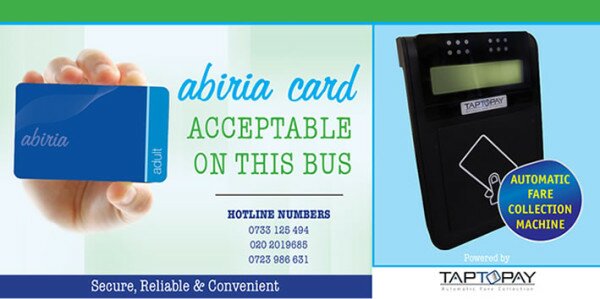
Kenya Commercial Bank (KCB) and Kenya Bus Services (KBS) have unveiled the Abiria card, which facilitates cashless payments on commuter buses in line with the government’s directive that all public service vehicles migrate to such methods by July 1.
Competition is rife in the industry ahead of July 1, with HumanIPO reporting earlier this month PesaPrint had joined Visa, MasterCard, Safaricom and Google’s “tap and go” Beba Pay, while the Matatu Owners Association (MOA) has partnered with Fibre Space Limited to launch My1963.
Powered by TapToPay and using the Near Field Communication (NFC) technology, the MasterCard-enabled card can be used for transit as well as in all MasterCard-branded acceptance outlets, while making it possible for commuters to enjoy other banking services with KCB such as mobile banking, agency banking and credit card facilities.
KCB will roll out 3 million cards to support a seamless transition in the transport sector.
Speaking at the launch, KCB chief business officer and Kenya managing director, Mr. Samuel Makome said the partnership supports the national payment integration system and the government agenda to embrace automation at all its collection points to seal revenue leakages as well as drive a cashless system in the payment space.
“The customers will enjoy a more secure platform. This will enable the public transport operators and public transport vehicle owners to collect revenues, drive loyalty programmes as well as establish a more holistic relationship that allows the bank to provide credit facilities such as asset financing, check-off loans, overdrafts among others,” said Makome.
KBS managing director Edwin Mukabanah said card readers have been installed in more than 260 buses.
“The cashless system will streamline the public transport sector making it more secure and give the public service vehicles investors’ greater control in revenue collection increasing efficiency and reduction of revenue leakages. It will also ease fleet management for the buses and formalise the public transport that has over time operated in an informal environment,” said Mukabanah.

















